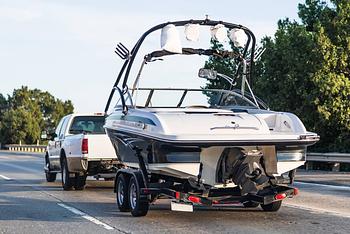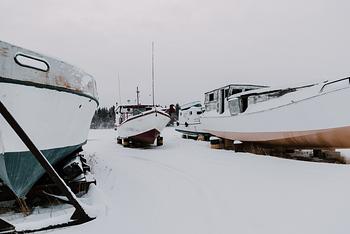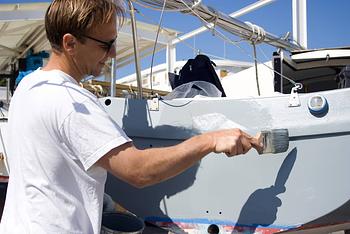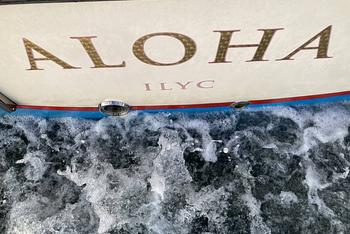To experience wildlife in its natural habitat is one of the most awe-inspiring and exciting activities there is. From dolphins and whales, to seals, turtles, seabirds and sharks there is so much to see and experience. Wildlife watching boat tours are hugely popular the world over, with local tour companies offering unforgettable days out for visitors and locals to get up close to marine wildlife. But with your own boat you can experience wildlife on your own terms, as often as you like without the need to sign up to crowded wildlife watching cruises.
Wildlife Watching from your Boat
Which kind of wildlife you might spot from you boat is of course dependent on where you live as well as the seasons, and it’s likely you’ll already know what animals can be spotted in your region. Marine wildlife is wonderfully diverse, with some animals such as seals, dolphins, whales, turtles, manatees, manta rays and seabirds commonly sighted, whilst others such as basking sharks, otters and sunfish are more shy, rare or elusive.
For the best chances of spotting wildlife it’s important to understand their patterns and habitats. Migrations will mean whales will pass through in large numbers at certain times of the year, but then move on completely at other times. Seabirds will nest at particular times of the year. Whales and dolphins favour open ocean, whereas manatees for example will be found in sheltered waterways. Whether it’s turtles on coral reefs, basking sharks close to shore or seals on rocky outcrops, knowing where to look will raise your chances of seeing them hugely.
The Do’s and Don’ts of Responsibly Watching Marine Wildlife
The most important consideration when observing marine wildlife is to ensure that their natural habitat is not disturbed and that the animals are not stressed or frightened. Even well-meaning wildlife lovers can inadvertently create a stressful environment for wildlife. It’s important to ensure:
-
You keep your distance from animals, whether they are in the water or on land. Boat engines are loud above water, but even louder below so switch off the engine as you approach and allow the boat to safely and silently bob whilst watching from a distance. A distance of 100 metres is recommended, and for no more than 15-30 minutes.
-
Remain calm and quiet. As exciting as it is to spot wildlife, you will have a better experience if you keep quiet and don’t scare off the animals.
-
Ensure the animals have plenty of space and that you and other boats or kayaks are not blocking their obvious escape route if they choose to leave. Animals separated from their family or pods can get into deep distress. When the animals choose to leave, don’t follow them and allow them to continue on their way.
-
If approached by wildlife, maintain a steady course or remain stationary and allow them to decide where they want to go.
-
Ensure you are not entering a marine protected area.
Follow National and Regional Guidance and Laws
Follow the guidance set out by national government wildlife departments. In the UK for example, The Green Blue - the joint environment campaign run by the Royal Yachting Association and British Marine – has created The Green Wildlife Guide for Boaters which offers a printable chart to keep on board.
Know the local laws as well as the national ones. In the United States for example, there may be stricter guidelines or laws for different regions and species. For example, boats may not get within 500 yards of a North Atlantic right whale as these are highly endangered, while in Alaska and Hawaii there is a compulsory 100 yard distance to be maintained between boats and humpback whales.
Watching Sea Birds from Your Boat
Use binoculars to observe seabirds and maintain a good distance. It is usually illegal to disturb any nest, but even where it may not be written in law it is essential you don’t touch any nests or eggs. If young birds are disturbed by humans it can cause them to leave their nest before they are ready to do so.
Why You Shouldn’t Feed Marine Wildlife
As wonderful as it is to see wildlife up close enjoying the food you have brought along, there are many reasons why you should never feed wild animals.
-
It is bad for their health. Marine animals have a very specific diet and the can get very ill or die from eating the wrong things.
-
Feeding wild animals changes their behaviour. Animals use migration routes and forage or hunt for their food. When they are regularly fed by humans it can change their natural rhythm and behaviours, something which can be passed down to subsequent generations.
-
Being wary of humans and possible danger is an important survival mechanism for wild animals. When we feed them, they lose that natural cautiousness and it can lead to animals getting hurt or humans getting bitten.
What to do if you Spot an Injured Animal from your Boat?
Sadly, injuries to marine wildlife are commonplace, with the vast majority coming from entanglement in discarded fishing gear. If you spot an animal in distress it’s vital that you don’t approach it yourself. Trapped and frightened animals can be extremely dangerous so it’s important to get professional help. Become familiar with the marine wildlife rescue organisations in your local area, and keep a list of their emergency numbers aboard. You will be asked several questions about the incident and your location so be sure to make a note of:
-
Your location and the time of the incident
-
Which species was involved, its condition and any identifying marks. For example, dorsal fin notches on whales and dolphins
-
What you saw. If you can take photos and/or videos that will be very helpful to rescuers
-
If you had a collision with an animal in your boat, it’s important that you report it. Many boaters don’t report these incidents for fear of repercussions, but sadly accidents happen and the relevant authorities might be able to help the animal. Firstly call the coast guard to report the incident and then make your way back to the harbour in case you have damage to your boat. It is also helpful to anonymously report your collision to the International Whaling Commission who maintain a database to help in whale migration research.
Don’t Forget the Camera
Photographing marine wildlife so you can share the experience with others or keep for years to come is hugely rewarding, and many mobile phone cameras do an excellent job of point-and-shoot photography. Videos too allow you to capture the entire experience. Photographing fast moving subjects from a moving platform isn’t easy though, so you may want to invest in a more professional camera that will allow you to capture spinning dolphins and breaching whales in perfect quality. Either way, don’t forget to sit back and enjoy the show as your memories will be the best reminder of this unforgettable experience.
Here at Rightboat.com, we are passionate about boat ownership and the lifestyle it can offer. Discover the fun and experiences owning a boat can bring you and your family with our inspirational blog, as well as our guides to owning and buying a boat.
Related Articles and Guides
29th Mar 2024
How to Transport Your Boat Four Different Ways
18th Oct 2023
How to Winterize a Boat: Steps, Checklist and Costs
20th Sep 2023
Painting a Fiberglass Boat: A Detailed Guide
19th Sep 2023






